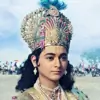Originally posted by: godisone
You're welcome😊, and thanks a bunch also for thinking about my explanation and understanding it. I don't write long descriptions or explanations for the fun of it or to argue with anyone. When I write something, my goal is to help someone understand my way of thinking, instead of getting angry, and when I read other peoples' responses, I too try to do the same. (I admit though that sometimes I get unreasonably angry, but I repent it later😳) After all, the whole point of any forum is to learn from other people's knowledge and become more informed in our puranas.I like your question, because it requires deep thinking.😛 Truthfully, I guess none of us will know, but Draupadi did come out of the fire instead of being born the normal way, and her destiny was that she would bring the destruction of many of the world's kings, and if the Kauravas truly repented and gave the Pandavas their kingdom back and asked for forgiveness, definitelty Yudhisthira would have forgiven them, if not Bhima and Arjuna, and if Yudhisthira forgave the Kauravas, the four brothers and Draupadi would have followed his example, had they wanted to or not, because they respected his opinon, but...if that happened, Draupadi's destiny would not be fulfilled (because the Kurukshetra War would not have happened), as well as Dhristadyumna's, Shikhandi's, and many many others who were born only to fulfill their destinies. And then Bhishma would not die, going against the rule of mortality/immortality. And to this day, Karna and many other warriors would not have achieved their glory, because Karna was known as a great brave warrior due mostly to the Kurukshetra War, and also, Kunti Devi would never have revealed her secret, so none of us today would have known Karna was the eldest Pandava, only that he was the friend of the wicked Duryodhana. So many many things would have changed had the Kauravas asked for forgiveness.But to answer your question, I feel that there is a chance Draupadi would have forgiven Dushashana if he had truly repented, because there is a very good example of the endlessness of her compassion.When Ashwathama killed the Upa-Pandavas (the sons of Draupadi), Draupadi had fallen senseless on the floor, and was in shock for a long while. Would a mother ever forget the death of her sons? Would a mother, who knew the killer of her beloved children, ever forgive him, and spare his life? Especially when that killer killed her sons, not on the battlefield which would have brought her sons everlasting glory, but while they were sleeping, thus breaking all codes of ethics and Dharma?But Draupadi did. When Ashwathama was brought to her and thrown at her feet, Draupadi got up respectfully and offered him arghya. She then pleaded with her husbands to spare Ashwathama's life, because killing a brahmin is against Dharma. She, the mother of five heroes who were killed heiniously, remembered Dharma while in shock and denial, while suffering from misery and depression at the loss of her sons. She had the power to bring about the death of the one who killed her sons against Dharma, yet she forgave Ashwathama, and compassion filled her heart. She, who knew the secrets of the Lord's doings, understood that her sons' time was up; that's why they died, and Ashwathama was only an instrument in their death.There's also another story where Jayadratha insulted Draupadi by kidnapping her when her husbands were not present, and when the Pandavas caught up to him and were about to kill him, Draupadi pleaded with them not to kill Jayadratha, because their sister cousin Dushala (Duryodhana's sister) was married to him and would be made a widow if they killed him.This shows that excepting the vastra-haran, Draupadi always kept her mind on Dharma even when faced with critical situations. Maybe she would not have forgiven Dushashana from her heart, but she might have been ready to take back her vow had he and the Kauravas returned Indraprastha and begged her forgiveness. But then, that would bring infamy to the Kuru-Vansh anyway, because once made, vows had to be kept, or disgrace was brought upon one's house.After the war ended, when Gandhari asked Bhima was he terribly killed all her sons without leaving at least one alive, he replied that he had repented his vows long before the war, but so not to bring disgrace to the family by going back on his vows, he had to stick to them. Bhishma always knew that it was Adharma to side with the Kauravas, but he did, because he did not want to go back on his vow that he would always support Hastinapura. Karna too knew that victory was inevitable for the Pandavas, but he had made a vow that he would always befriend Duryodhana and support him, and he did not want to bring disgrace to his name.But we must also keep in mind that the vastra-haran was Draupadi's most humiliating moment in her life, and she had felt anger during it that she did not feel even at her sons' deaths. There's a chance she might not have forgiven the Kauravas, but she also might have. I honestly don't know.




















